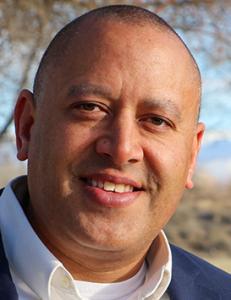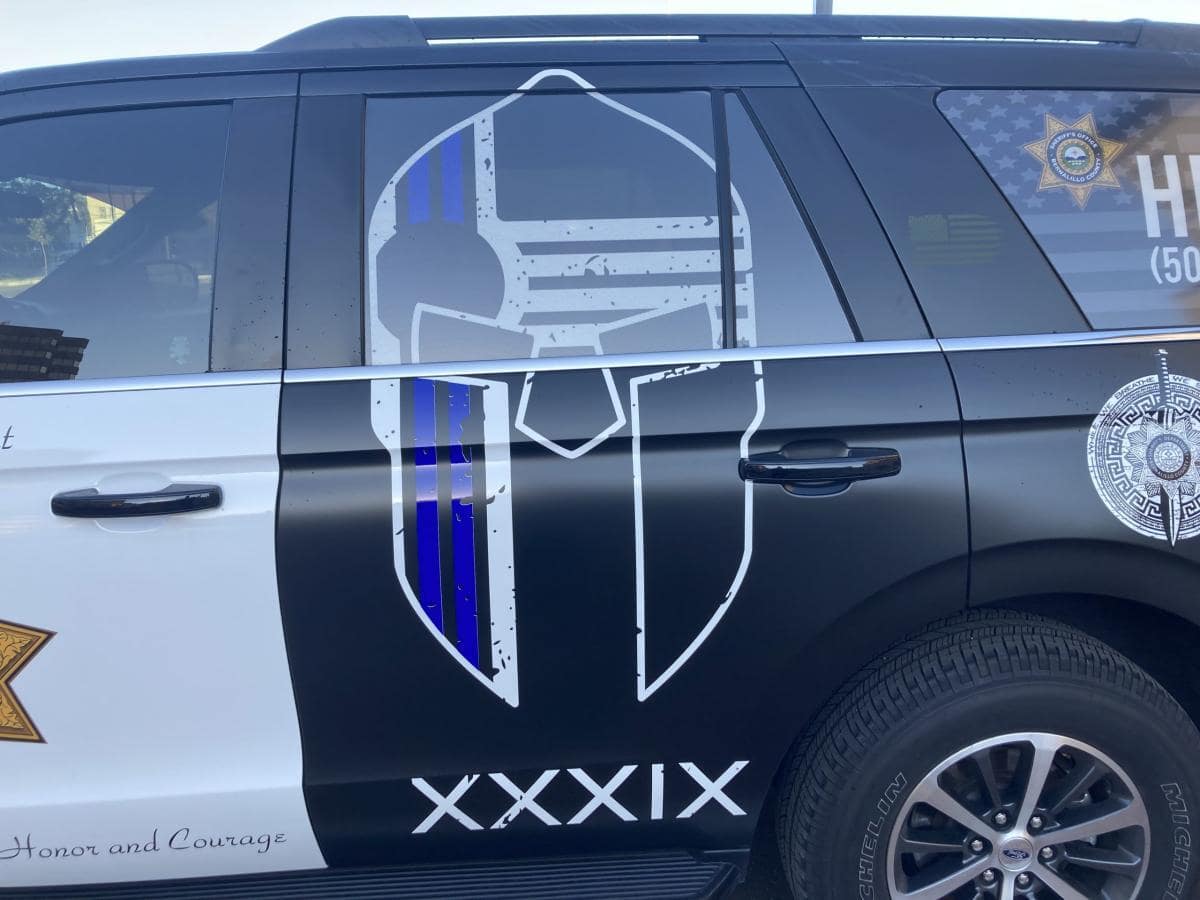
A little more than two years after the Bernalillo County Sheriff’s Office got on-body cameras for its deputies — the devices look like smartphones but are locked into their functions so they cannot make calls — the newly sworn-in administration says it has uncovered several issues that make the system challenging to use.
Among the issues they point to: the microphones are the same as those on cellphones and therefore are affected by wind or area noise; they don’t have enough memory for videos to record for more than about seven hours without being clipped; the videos take a long time to upload or are impossible to upload if a deputy doesn’t have good cell service; once the videos are uploaded it can take weeks for the company to process them so deputies can view them again; and – unlike the system that other local agencies use – there is no easy way for the sheriff’s office to share long videos with the media or others.

“As an opinion coming from me, the technology that we have right now for body-worn cameras is trash,” Sheriff John Allen said in a recent interview.
He said he has asked his staff to look at other options and see if the office is able to get out of the contract.
“If I’m stuck in a contract of technology that I don’t like … I don’t even know why we have to discuss this and now we’re telling you all the problems with this camera system or the system itself,” Allen said. “I wish we didn’t have to.”
The $3.8 million contract with Utility Inc. was signed by the county manager in November 2020 and is for a five-year term, although there are termination provisions. It includes the BodyWorn devices, two cameras in each vehicle (one in the front and one in the back), hotspots for Wi-Fi in the deputies’ cruisers, tailoring so the uniforms can hold the devices, and a holster that will automatically activate the cameras when a firearm is drawn.
The previous sheriff, Manuel Gonzales, who had championed the cameras as the latest technology, did not respond to questions or requests for comment. He had been resistant to on-body cameras for years but the department was forced to adopt them in response to statewide legislation passed in 2020.
Too rushed to research
Allen brought up the issue with the on-body cameras in response to a recommendation by the Sheriff’s Office Advisory and Review Board that “simultaneously with the release of a video that has been edited/redacted, BCSO should release a thorough explanation of the reason for the redaction, and a statement as to when/if the edited/redacted material will, or is expected to be, released in full.”
Allen said he “absolutely” agrees with that recommendation, which was one of nine made in the board’s annual report, but as it stands right now the longer videos are always going to appear to be edited since the videos get clipped at a certain time.
And Jayme Fuller, the BCSO spokeswoman, said exporting the videos to provide them to the media or other entities is an onerous process because, unlike with the Albuquerque Police Department and the New Mexico State Police, there is no way to easily share them through an online portal.
“When they’re too long … they stay in the cloud,” said Undersheriff Johann Jareno. “We don’t even have access to download it. So we have to wait for the company to process them and then give us access to it.”
Allen said he has talked with some of the people who were in charge of choosing the cameras and they have said they should have done more research.
“I think the sheriff’s office is way behind the power curve because they should have body cams probably two years previous,” Allen said. “And then the law came out and they were rushed and I think that pushed people into the corner to get things done.”
More recommendations
Allen said he met with the nine-member Sheriff’s Office Advisory and Review Board and he thinks it is a good way for the public to voice opinions or concerns and its feedback can allow the office to evaluate its own strengths and weaknesses to see how it can evolve.
“I think they’re a great avenue for people that are having issues with the recruiting vehicle, (Standard Operating Procedure) ideas — they have them also,” Allen said. “That’s our job to evaluate them and see if they’re even practical.”
While Allen said some of the board’s recommendations were already done — such as taking the recruitment vehicles with images that some found problematic off the street — others — like the sharing of unedited video footage — he said he agreed with in theory but will be harder to implement.
The other recommendations include:
• BCSO should update its current quarterly posting of crime statistics on its website to a more timely and immediate reporting schedule, in line with the practices of other law enforcement agencies such as APD.
Allen said he has taken all crime data off the website right now and has people working on it. He said they hope to be up and running by early February but ultimately they need more civilian staff in order to provide more complete data.
• In investigations of officer-involved shootings, the standard practice of having the shooter’s agency designated the “Lead Agency” risks being or appearing to be a conflict of interest. The designation “Lead Agency” in the agreements governing such investigations should be replaced with language that more accurately describes the cooperative and joint investigative process that actually occurs, according to information provided by BCSO.
Allen said that ideally he would like the state Attorney General’s Office or another outside entity to handle all shootings by officers so as to avoid any conflicts of interest. However, he said, the Legislature would have to provide funding for that to happen.
In the meantime, Allen said, if a shooting involving his deputies is perceived to be controversial he would like for the investigation to be led by another agency.
• A handful of changes to standard operating procedures including that BCSO’s website allow the public to comment on SOP.
Allen said he worries that comments made on the website “might get lost” and that he thinks it’s better if the public go directly to the review board with their input instead.
• BCSO should attend all the meetings of Albuquerque Mayor Tim Keller’s Metro Crime Initiative every year and there should be at least some direct participation by the sheriff, since cooperation among all law enforcements agencies — local, county, state and federal — enhances law enforcement efforts and public safety.
Allen said he plans on doing that and has had other meetings with local law enforcement and community partners as well.
• BCSO should consider once again gaining accreditation under the Commission on Accreditation for Law Enforcement Agencies.
Allen said he didn’t think this was necessary since BCSO’s internal review board and the New Mexico Association of Counties looks at its Standard Operating Procedures to make sure they’re up to par. BCSO hasn’t been part of CALEA since 2017 and only two agencies in New Mexico are part of it – the Los Alamos Police Department and the Farmington Police Department.
• BCSO should cease participation in the reality television show “On Patrol Live.” If it is not willing to cease participation, then BCSO should discontinue participation until provisions can be made to allow any member of the public to opt out of being filmed by the TV cameras and to give BCSO the right to prior review of all video it is involved in.
The sheriff’s office is already taking a break from being on the show while the new administration settles in.
“We’ll look at it in April,” Allen said. “To be completely up front, it’s something of ‘do I really need to focus on that now?’ We’re trying to reorganize the department and focus on crime. I’m not saying it won’t come back … I just don’t even want to deal with it right now.”
• BCSO has the right to enter into contracts without legal review by the Bernalillo County Attorney’s Office or any other attorney, but it should exercise its discretion in favor of putting all but the most routine contracts through legal review before they become effective.
“We’re already doing that,” Allen said.

• The recruitment vehicle at issue — which had a Spartan helmet with the Thin Blue Line flag and the phrase “Always choose the hard right” – should be taken out of public view immediately until all offensive images are removed. Going forward, before using imagery on BCSO vehicles or property other than the standard logo and contact information, the office should thoroughly vet it to ensure it is not offensive, frightening or off-putting to the community.
Allen said he has taken the recruitment vehicle off the streets until it can be re-wrapped and BCSO is mulling over ideas for future vehicles, including putting deputy’s faces on them, getting community input or using designs from local artists.








